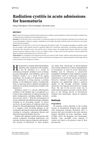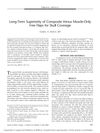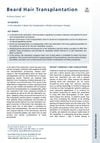 6 citations,
July 2017 in “Clinics in Plastic Surgery”
6 citations,
July 2017 in “Clinics in Plastic Surgery” The document concludes that individualized reconstruction plans are essential for improving function and appearance after head and neck burns.
 April 2023 in “Journal of Investigative Dermatology”
April 2023 in “Journal of Investigative Dermatology” Weight loss surgery improved several skin conditions in obese patients but often caused hair loss.
 January 2024 in “Deleted Journal”
January 2024 in “Deleted Journal” Radiation cystitis patients need better monitoring and early treatment due to higher readmission rates.
[object Object]  14 citations,
May 2004 in “Annals of Plastic Surgery”
14 citations,
May 2004 in “Annals of Plastic Surgery” Composite flaps are better than muscle-only flaps for long-term skull coverage.
 7 citations,
August 1989 in “The Journal of Dermatologic Surgery and Oncology”
7 citations,
August 1989 in “The Journal of Dermatologic Surgery and Oncology” Facelifts can lead to high patient satisfaction and a quick recovery when done correctly.
 August 2024 in “Current Protocols”
August 2024 in “Current Protocols” The C3H/HeJ mouse model is useful for studying and testing treatments for alopecia areata.
 October 1997 in “Baylor University Medical Center Proceedings”
October 1997 in “Baylor University Medical Center Proceedings” Obesity in the U.S. is largely influenced by diet and exercise, certain medications can improve heart procedures and hair growth, and major teaching hospitals have better patient outcomes.
May 2023 in “Clinical and translational neuroscience” Tailored neurorehabilitation programs improve life quality for post-COVID-19 patients.
 8 citations,
February 2022 in “Journal of Clinical Medicine”
8 citations,
February 2022 in “Journal of Clinical Medicine” Many COVID-19 patients experience temporary hair loss after infection, not linked to infection severity or treatment.
 7 citations,
December 2021 in “Journal of The American Academy of Dermatology”
7 citations,
December 2021 in “Journal of The American Academy of Dermatology” COVID-19 can cause hair loss starting as early as 18 days after infection.
 14 citations,
October 2016 in “Psychoneuroendocrinology”
14 citations,
October 2016 in “Psychoneuroendocrinology” Finasteride affects brain processes related to neurotransmission and metabolism, potentially helping with neuropsychiatric conditions.
 October 2023 in “Pathology”
October 2023 in “Pathology” A woman had a rare reaction to ear piercing that caused earlobe swelling, which was best treated by removing the piercing and not re-piercing.
 2 citations,
July 2021 in “Dermatologic Therapy”
2 citations,
July 2021 in “Dermatologic Therapy” A woman's hair loss after COVID-19 was likely due to a mix of pressure-induced alopecia and acute telogen effluvium.
September 2014 in “Archives of disease in childhood” A 12-year-old boy had severe shingles and skin damage after a stem-cell transplant.
 August 2018 in “Journal of The American Academy of Dermatology”
August 2018 in “Journal of The American Academy of Dermatology” A 90-year-old woman's hand lesion was a rare, aggressive skin cancer treated successfully with surgery.
 September 2009 in “European Urology Supplements”
September 2009 in “European Urology Supplements” After prostate removal surgery, higher initial prostate size was linked to higher urethral PSA levels and more severe male pattern baldness.
 14 citations,
August 2018 in “Frontiers in Cellular and Infection Microbiology”
14 citations,
August 2018 in “Frontiers in Cellular and Infection Microbiology” Dengue virus can infect human hair follicle cells and may cause hair loss.
 April 2018 in “Journal of Investigative Dermatology”
April 2018 in “Journal of Investigative Dermatology” High amphiregulin in the skin is a bad sign for acute graft-versus-host disease.
 February 2024 in “PubMed”
February 2024 in “PubMed” More people experience hair loss after recovering from COVID-19 in hospitals than in outpatient settings.
October 2022 in “Biomolecules” Allopregnanolone can reduce gut inflammation and normalize neurotransmitter levels after finasteride withdrawal.
June 2020 in “Faculty Opinions – Post-Publication Peer Review of the Biomedical Literature”  3 citations,
December 2011 in “Pediatric Dermatology”
3 citations,
December 2011 in “Pediatric Dermatology” The patient's long-term hair loss was caused by leukemia treatments and low estrogen levels, worsened by her genetic tendency for hair loss.
[object Object]  January 2023 in “Karger Kompass. Dermatologie”
January 2023 in “Karger Kompass. Dermatologie” Scientists are still unsure what triggers the immune system to attack hair follicles in Alopecia areata.
 3 citations,
April 2020 in “Facial Plastic Surgery Clinics of North America”
3 citations,
April 2020 in “Facial Plastic Surgery Clinics of North America” Beard hair transplantation is generally satisfying, requires 250-800 grafts, uses FUE to avoid scars, needs careful planning, has some risks, and hair regrowth starts after 4-6 months.
 30 citations,
November 2018 in “EMBO Reports”
30 citations,
November 2018 in “EMBO Reports” The Ovol2-Zeb1 circuit is crucial for skin healing and hair growth by guiding cell movement and growth.

Tacrolimus causes fewer acute rejections than cyclosporin A in kidney transplants but doesn't necessarily improve kidney function after one year; cardiovascular risks and side effects vary between the two drugs.
 January 2017 in “SM dermatology journal”
January 2017 in “SM dermatology journal” Eyebrow hair transplants have high patient satisfaction and require surgeons to have artistic and technical skills.
 2 citations,
May 2012 in “Annals of Oncology”
2 citations,
May 2012 in “Annals of Oncology” Patients with advanced breast cancer and high hormone receptor levels who had surgery for ovarian/pelvic metastases lived longer, especially if they had high estrogen receptor levels.
 1 citations,
October 2021 in “Indian Journal of Plastic Surgery/Indian journal of plastic surgery”
1 citations,
October 2021 in “Indian Journal of Plastic Surgery/Indian journal of plastic surgery” Proper hair care and safe use of hair products are crucial for those with hair loss.
 January 2002 in “Nowotwory”
January 2002 in “Nowotwory” Hair transplant is effective for treating hair loss caused by radiation and improves patients' quality of life.


























